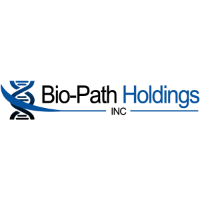
FMP

Bio-Path Holdings, Inc.
BPTH
NASDAQ
Bio-Path Holdings, Inc. operates as a clinical and preclinical stage oncology focused RNAi nano particle drug development company in the United States. The company develops products based on DNAbilize, a drug delivery and antisense technology that uses P-ethoxy, which is a deoxyribonucleic acid (DNA) backbone modification intended to protect the DNA from destruction. Its lead drug candidate is prexigebersen, which is in Phase II clinical trials for the treatment of acute myeloid leukemia (AML) and myelodysplastic syndrome. It is also developing Liposomal Bcl-2 for the treatment of refractory/relapsed lymphoma and chronic lymphocytic leukemia; Liposomal STAT3 that is in preclinical stage for the treatment of pancreatic cancer, non-small cell lung cancer, and AML; and prexigebersen-A for various solid tumors. Bio-Path Holdings, Inc. was founded in 2007 and is based in Bellaire, Texas.
1.39 USD
0.35 (25.18%)
DuPont Analysis
The DuPont analysis, pioneered by the DuPont Corporation, offers a structured approach to assessing fundamental performance. It involves breaking down the return on equity (ROE) into various components, aiding investors in comprehending the factors influencing a company's returns.
ROE = Net Income / Average Total Equity
ROE = (Net Income / Sales) * (Revenue / Average Total Assets) * (Average Total Assets / Average Total Equity)
The company's tax burden is (Net income ÷ Pretax profit). This is the proportion of the company's profits retained after paying income taxes. [NI/EBT] The company's interest burden is (Pretax income ÷ EBIT). This will be 1.00 for a firm with no debt or financial leverage. [EBT/EBIT] The company's operating income margin or return on sales (ROS) is (EBIT ÷ Revenue). This is the operating income per dollar of sales. [EBIT/Revenue] The company's asset turnover (ATO) is (Revenue ÷ Average Total Assets). The company's equity multiplier is (Average Total Assets ÷ Average Total Equity). This is a measure of financial leverage. Profitability (measured by profit margin) Asset efficiency (measured by asset turnover) Financial leverage (measured by equity multiplier)